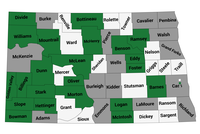Herbicide-resistant kochia testing kits available for North Dakota farmers
(Click an image below to view a high-resolution image that can be downloaded)
-

North Dakota Herbicide Resistant Weed Survey kits can be picked up at your county NDSU Extension office or you can obtain a submission form from the NAGC website. (NDSU photo) -

Counties in green contain at least one population of kochia with genetically confirmed resistance to Groups 2, 9, and 14 herbicides. Gray counties are those that submitted samples, but did not have resistance to all three herbicide groups. (Photo source: Zack Bateson, Research Director, National Agricultural Genotyping Center)
Herbicide-resistant kochia remains one of the most troublesome weeds to manage in North Dakota fields, says Victor Gomes, North Dakota State University Extension cropping systems specialist. Its management has become increasingly difficult due to its high adaptability to adverse conditions, allowing kochia to outcompete crops under stressful conditions, and its resistance to multiple herbicide groups.
“In North Dakota, we can find kochia populations that are resistant to PPO-inhibiting (Group 14), Glyphosate (Group 9) and ALS-inhibitors (Group 2) herbicides, with some populations showing two- or three-way resistance (i.e., resistance to two or three herbicide groups simultaneously),” says Gomes.
NDSU weed scientists first confirmed resistance to PPO-inhibiting (Group 14) herbicides in kochia in 2022. In a collaborative effort, BASF scientists discovered a target-site mutation in kochia that provided resistance to Group 14 herbicides. Once the target site was identified, the National Agricultural Genotyping Center (NAGC), located on NDSU’s campus, developed a rapid test to detect the mutation from DNA extracted from leaves.
Thanks to sponsorships from the North Dakota Corn Utilization Council, North Dakota Soybean Council, North Dakota Specialty Crop Block Grant and Minor Crop Utilization Grants, funding is available for North Dakota farmers to test the first 1,000 North Dakota pigweed or kochia samples for free.
Free testing is limited to four samples per farming operation. If planning to submit more than four samples, or if submitting samples from outside of North Dakota, please refer to the NAGC website, at https://genotypingcenter.com/product/herbicide-resistant-weed-survey/, for charges and submission form.
North Dakota Herbicide Resistant Weed Survey kits can be picked up at county NDSU Extension offices or obtained from the NAGC website. Results are available within 7 days after arrival at the NAGC.
“With the cropping season moving fast, the timing for collecting your sample is crucial to obtain an accurate diagnosis,” shares Gomes. “As a rule of thumb, growers should scout their fields within a week of burndown herbicide application and look for surviving plants. Kochia plants that survived herbicide application, should be genetically tested for resistance.”
Individual sample results and their specific origin will remain confidential. Data will be aggregated and displayed on the county level, but no individual information will be released.
To collect a sample for testing:
- Locate pigweeds or kochia in the field. Proper ID is important before collecting leaf samples.
- Collect two leaves near the top of the plant (leaves must be larger than a standard hole-punch to allow for adequate DNA extraction). Place two (2) leaves from a single plant into one (1) zipper bag or small envelope. Do not mix leaves from multiple plants.
- With a marker, label the outside of the collection bag with a unique Sample ID. The Sample ID can be in the following format: Year-Month-County-Personal Field ID (Example: 24-05-Cass-SE4). Make sure to also write the Sample ID on the submission form.
- Sample additional weeds in fields of your choice by following Steps 1 to 3. Send a maximum of four (4) total plants for testing. Keep samples dry and at room temperature before shipping.
- Mail the submission form and individually-packaged samples in a large business envelope to: National Ag Genotyping Center, 1616 Albrecht Boulevard North, Fargo, North Dakota, 58102.
It is important to note that these tests can only detect target-site mutations that confer herbicide resistance. Additionally, only the most commonly reported mutations are covered by these tests. The tests are highly accurate for these known mutations, but it is important to know that resistance mechanisms exist that are not detected by these tests.
NDSU Agriculture Communication – May 22, 2025
Source: Victor Gomes, 701-456-1102, victor.gomes@ndsu.edu
Source: Joe Ikley, 701-231-8157, joseph.ikley@ndsu.edu
Editor: Kelli Anderson, 701-231-6136, kelli.c.anderson@ndsu.edu

